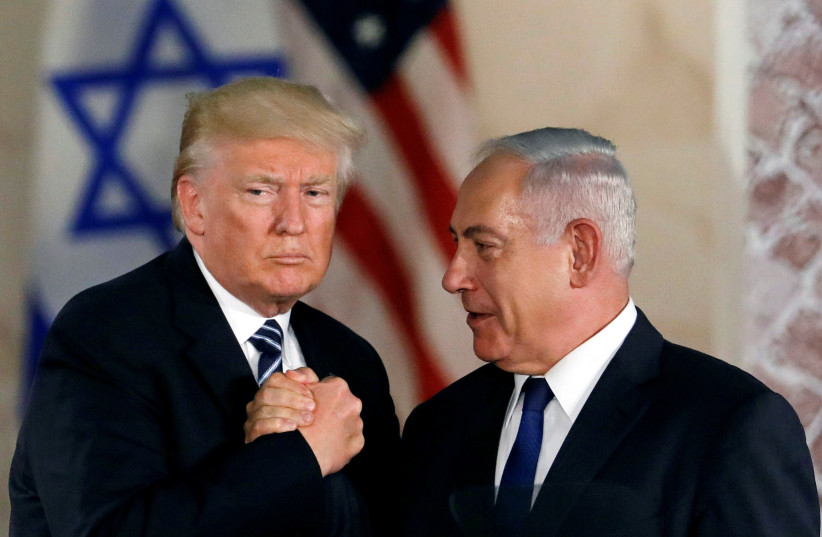Years from now, historians will enjoy debating our misery. Watching most Americans fear a depressing Joe Biden-Donald Trump rematch while watching Israel stumble left and right raises the question: Are these two crises uniquely American and Israeli, or do they reflect worldwide pathologies haunting democracies today?
As a narrative historian, I instinctively plunge into the particularities – especially because each story is so wild. Biden’s tale would be comic if it weren’t tragic – and dangerous. A politician works so long to become president that by the time he moves into the White House he should be moving to a retirement village, having become too old to be the kind of president he hoped to be decades earlier.
Even if you like Biden’s policies, compare the videotapes of Biden today with five or 10 or 20 years ago. I am not being ageist or Trumpian or disrespectful. I am simply pointing out the problem that worries 68% of Americans – including 48% of Democrats.
The presidential job description includes mastering what Theodore Roosevelt called the “Bully Pulpit” to unite the nation and resist toxic demagogues when necessary, while making Americans feel good about America always. Biden’s fragility prevents him from projecting the vigor that’s needed – which is especially harmful with the Trumpian threat looming.
And, oh, what a threat that is!

Yes, many readers will hail Trump’s noble recognition of Jerusalem as Israel’s capital and his Nobel-prize-worthy Abraham Accords breakthrough. But nothing, nothing, justifies his despicable assault on decency, democracy, the Constitution, and the rule of law.
Even more outrageous – and terrifying – than his behavior, are the millions of Americans supporting him blindly. These devotees reject any criticism, any indictments, any concerns raised about this monstrous man’s decade-long blitz against the precious, unseen, connective tissues of civility and trust that keep democracies democratic.
Is Netanyahu as bad as Trump?
SIMILARLY, WHILE Prime Minister Benjamin Netanyahu’s behavior is not as criminal as the charges against Trump, that’s a depressingly low standard of judgment. Netanyahu too keeps assailing the constructive norms, invisible links, and bonding niceties that have long kept Israel functioning as a remarkably united nation, despite our deep divisions and dizzying diversity.
Democracies only work when fellow citizens see political rivals as somewhat misguided, not mortal threats. Alas, Netanyahu’s government is so extreme and incompetent, and his and his ministers’ behavior is so toxic, that a particularly poisonous opposition has emerged.
The four disgraces are neither morally equivalent nor equally dangerous. There’s much room for disagreement and debate, although I cannot understand at this point how any patriotic American could still vote for Trump.
In Israel, while many protesters are justifiably worried about this government, the protest leaders have gone off the rails. Moderates, disgusted by the silence of the Likud lambs and the spinelessness of religious Zionists, who have let Itamar Ben-Gvir profane their holy movement, should be equally shocked by the anti-Bibi fervor and allergy to self-criticism.
Protesters should protest Ehud Barak’s venomous rantings and videotaped plottings; the treacherous language of opposition leaders who, in newspapers abroad, denounce Israel as an apartheid state about to collapse; and the self-destructive, bad-precedent-setting behavior of reservists threatening not to serve; and doctors threatening not to doctor.
Clearly, epidemics of horrific leadership and atrocious behavior haunt two of the world’s greatest democracies. This rampage of recklessness left and right reflects three big, broad, bad trends.
First, all-enveloping partisanship made even a confusing, scientific dispute about mask-wearing during COVID, a partisan issue in America – and an identity-signifier. That zealousness reflects the spreading partisan blindness which has MAGA voters ignoring Trump’s alleged crimes and responsible Democrats ignoring Biden’s decline.
Second, the all-or-nothingness surrounding most controversies has made politics theological, turning debates into good-versus-evil, rather than the better-of-two-evils whereby choices made are properly considered and balanced.
Such fanaticism riles Israelis daily with Channel 14’s pro-Bibi propagandizing as he destroys his legacy piece-by-piece, paralleled by a supposedly pro-democracy movement setting horrific precedents in unpatriotic protests that their opponents will mimic next time.
Finally, the pervasive, invasive, nature of social media freezes, weaponizes, and catastrophizes once-manageable differences of opinion into do-or-die fights between Team Good and Team Evil.
IN THIS zero-tolerance, all-or-nothing environment, if we disagree about one thing, we disagree about everything. And if you disagree with me about everything good, you clearly must be bad, and worth shunning, while – with such high stakes – I can never criticize my side, no matter how criminal or senile or incompetent or destructive my allies might be.
These pathologies reflect a crisis of trust and a plague of panic. The more we withdraw into silos in modern society, the more our neighborhoods and algorithms and demagogues and chips-on-our-shoulders spin us into our own self-referential identity ghettos, and the less faith we have in those who might be different from us, sociologically, ideologically, and politically.
In our media-addled, headline-driven world, we careen from panic to panic, from one Chicken Little “the sky is falling” cry, to another.
True, the problems in both countries are real, the divisions run deep. But the less we interact through social media and mass media, and the more we try some person-to-person, community-to-community, and sector-to-sector dialogue – especially with fellow citizens who dare to disagree with us – the more we will remember the stirring words of Yitzhak Rabin.
In 1994, he reminded us that “We are all one people, all Israelis, and we all share a single fate.” May those words penetrate the soul of every Israeli politician and voter too.
The writer is the editor of the new three-volume set, Theodor Herzl: Zionist Writings, the inaugural publication of The Library of the Jewish People (www.theljp.org).
